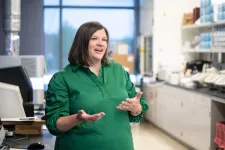(Press-News.org) The public are in favour of the development of bacteria-killing viruses as an alternative to antibiotics – and more efforts to educate will make them significantly more likely to use the treatment, a new study shows.
The antimicrobial resistance (AMR) crisis means previously treatable infections can kill. This has revitalised the development of antibiotic alternatives, such as phage therapy, which was first explored over a century ago but abandoned in many countries in favour of antibiotics.
The study shows public acceptance of phage therapy is already moderately high, and priming people to think about novel medicines and antibiotic resistance significantly increases their likelihood of using it.
There is a higher acceptance of phage therapy when described without using perceived harsh words, such as “kill” and “virus” but instead “natural bacterial predator”.
Those who took part in the survey had a high awareness of antibiotic resistance – 92 per cent had heard of antibiotic resistance, but only 13 per cent reported that they had heard about phage therapy prior to the survey.
Success and side effect rate, treatment duration, and where the medicine has been approved for use, influenced their treatment preferences.
The study was conducted by Sophie McCammon, Kirils Makarovs, Susan Banducci and Vicki Gold from the University of Exeter.
Dr Banducci said: “While phage therapy remains poorly understood by the UK public our research suggests there is extensive acceptance and support for its development. Exposure to only very limited information about antibiotic resistance and alternative treatments to antibiotics greatly increases the public acceptance of phage therapy.”
Dr Gold said: “Those involved in the research wanted to know more about phage therapy and were inspired to research this topic after completing our survey. Exposure to only a very limited amount of information about phage therapy significantly increases acceptance.”
Researchers held a workshop with experts and a review of phage research. They also fielded a survey assessing the UK public’s acceptance, opinions and preferences regarding phage therapy. A total of 787 people completed the survey, distributed in December 2021.
One group was given two scenarios; in the first they presented with a minor infection, and in the second they presented with an infection that did not respond well to antibiotics for three months. In each scenario, the group ranked the selected attributes based on their importance in deciding whether to accept a treatment or not.
Participants were randomly assigned one of four descriptions of phage therapy and then surveyed to assess their acceptance of the treatment. The acceptance of phage therapy was high across the board. However, describing phage therapy using perceived harsh words, such as “kill and “virus”, resulted in lower acceptance rates than alternative descriptions. Additionally, participants who had recent exposure to information about antibiotic resistance and alternative treatments were more accepting of phage therapy.
From the 787 participants who completed the survey, 213 left written responses expressing their opinions on the potential of phage therapy. Of this group, 38 per cent showed a specific interest in phage therapy development, while a further 17 per cent supported the development of antibiotic alternatives generally.
Sophie McCammon said: “An advantage of phage therapy is often the minimal side effects. Emphasising this through education and marketing may increase public acceptance of phage therapy.
“Even though phage therapy may be some years away from routine clinical use in the UK, increasing pressures from the AMR crisis require evaluation of the UK public’s acceptance of alternative treatments.
“The public desire for increased education is apparent. Expanding schemes which are interactively involving children in phage research not only generates excitement for the therapy now, but also promotes awareness in the generation likely to be treated with antibiotic alternatives.”
END
Public aware of and accept use of bacteria-killing viruses as alternative to antibiotics, study shows
2023-05-22
ELSE PRESS RELEASES FROM THIS DATE:
How a drought affects trees depends on what’s been holding them back
2023-05-22
(Santa Barbara, Calif.) — Droughts can be good for trees. Certain trees, that is.
Contrary to expectation, sometimes a record-breaking drought can increase tree growth. Why and where this happens is the subject of a new paper in Global Change Biology.
A team of scientists led by Joan Dudney at UC Santa Barbara examined the drought response of endangered whitebark pine over the past century. They found that in cold, harsh environments — often at high altitudes and latitudes — drought ...
RIT and URMC researchers study maternal nutrition and oral health for clues to childhood tooth decay
2023-05-22
Researchers from Rochester Institute of Technology and the University of Rochester Medical Center are taking a closer look at nutritional factors during pregnancy and in infancy associated with severe tooth decay in young children.
Brenda Abu, assistant professor in RIT’s Wegmans School of Health and Nutrition and a researcher in maternal and child health, is collaborating on a study to investigate the Oral Microbiome in Early Infancy (OMEI) and Nutrition. Perinatal oral health expert Dr. Jin Xiao, associate professor at the Eastman Institute for Oral Health, is leading a large project funded by the National ...
Two small businesses added to Sandia National Laboratories’ Mentor-Protégé program
2023-05-22
ALBUQUERQUE, N.M. — Sandia National Laboratories grew its Mentor-Protégé program from three companies to five with the addition of Dynamic Structures and Materials, LLC of Franklin, Tennessee, and Compunetics Inc., of Monroeville, Pennsylvania. The program not only helps small businesses develop and grow, but also helps foster long-term relationships that help Sandia achieve its mission.
As one of 17 DOE national laboratories, Sandia’s mission includes: anticipating and resolving emerging national security challenges and innovating and ...
Scientists at Wake Forest University School of Medicine discover metabolic sensor may play role in Alzheimer’s disease
2023-05-22
WINSTON-SALEM, N.C. – May 22, 2023 – It’s well-known that people with Type 2 diabetes are at an increased risk of developing Alzheimer’s disease, but the reason why isn’t fully understood and is an area of current research.
Now, scientists at Wake Forest University School of Medicine have uncovered a novel mechanism that shows increased sugar intake and elevations in blood glucose are sufficient to cause amyloid plaque buildup in the brain, which increases the risk of Alzheimer’s disease. Amyloid plaque is made up of toxic proteins in the brain.
The study findings appear online ...
Early Frontier users seize exascale advantage, grapple with grand scientific challenges
2023-05-22
With the world’s first exascale supercomputing system now open to full user operations, research teams are harnessing Frontier’s power and speed to tackle some of the most challenging problems in modern science.
The HPE Cray EX system at the Department of Energy’s Oak Ridge National Laboratory debuted in May 2022 as the fastest computer on the planet and first machine to break the exascale barrier at 1.1 exaflops, or 1.1 quintillion calculations per second. That’s more calculations per second than every human on Earth could perform in four years.
Frontier ...
Researchers modify drug to enter cells and treat pain
2023-05-22
Altering the chemical properties of an anti-nausea drug enables it to enter an interior compartment of the cell and provide long-lasting pain relief, according to a new study led by researchers at NYU College of Dentistry’s Pain Research Center.
The study, published in the Proceedings of the National Academy of Sciences (PNAS), illustrates how pain signaling occurs inside cells rather than at the surface, highlighting the need for drugs that can reach receptors within cells.
G protein-coupled receptors (GPCRs) are a large ...
Ozone treaty is delaying first ice-free Arctic summer
2023-05-22
A 1987 global deal to protect the ozone layer is delaying the first ice-free Arctic summer by up to 15 years, new research shows.
The Montreal Protocol – the first treaty to be ratified by every United Nations country – regulates nearly 100 man-made chemicals called ozone-depleting substances (ODSs).
While the main aim was to preserve the ozone layer, ODSs are also potent greenhouse gases, so the deal has slowed global warming.
The new study shows the effects of this include delaying the first ice-free ...
Montreal protocol is delaying first ice-free Arctic summer
2023-05-22
New York, NY—May 22, 2023—When scientists discovered a hole over Antarctica in 1985, countries across the globe got together and wrote a treaty designed to protect the ozone layer, which shields the Earth--and us--from harmful levels of ultraviolet radiation. The resulting Montreal Protocol, the only United Nations treaty ratified by every country in the world, was signed in 1987 and entered into effect in 1989, when little was known about its impact on the global climate. Its purpose was to reduce atmospheric concentrations of ozone-depleting substances (ODSs), materials ...
Targeting Phage Therapy World Congress will bring Phage Therapy up to another level with more than 70 communications
2023-05-22
The 6th World Congress on Targeting Phage Therapy 2023, being held on June 1-2 in Paris, will include more than 70 communications highlighting the most recent advances in phage and phage therapy.
150+ attendees will gather to discuss the future potential of phage therapy. The most strategic question to discuss is: “how to bring phage therapy up to a new level?”.
Targeting Phages 2023 will address how phages play a strategic role to combat infection and antibiotic resistance. A special session ...
A brand new, shiny CAR design
2023-05-22
Immunotherapy is rapidly becoming a well-founded form of cancer treatment as it employs and strengthens a patient’s immune system to attack tumors.
Chimeric antigen receptor (CAR) T cells – genetically altered T cells used in immunotherapy that can locate and destroy cancer cells – show great promise. Yet they still struggle in broader applications, particularly in attacking non-tumor cells and persistence in killing tumor cells.
Natasa Miskov-Zivanov, principal investigator and assistant professor of electrical and computer engineering at the University of Pittsburgh Swanson School of Engineering, received a $299,986 EAGER ...






